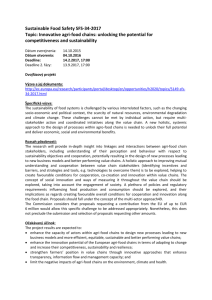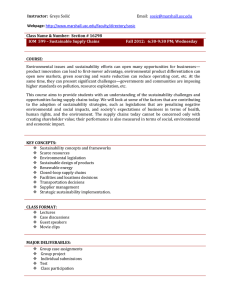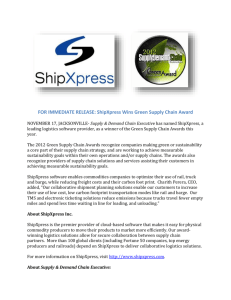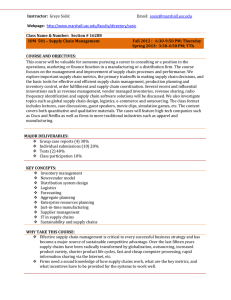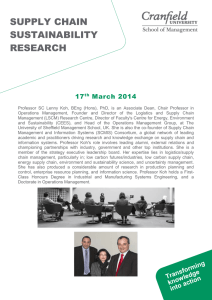– Outline PROJECT SCALE
advertisement
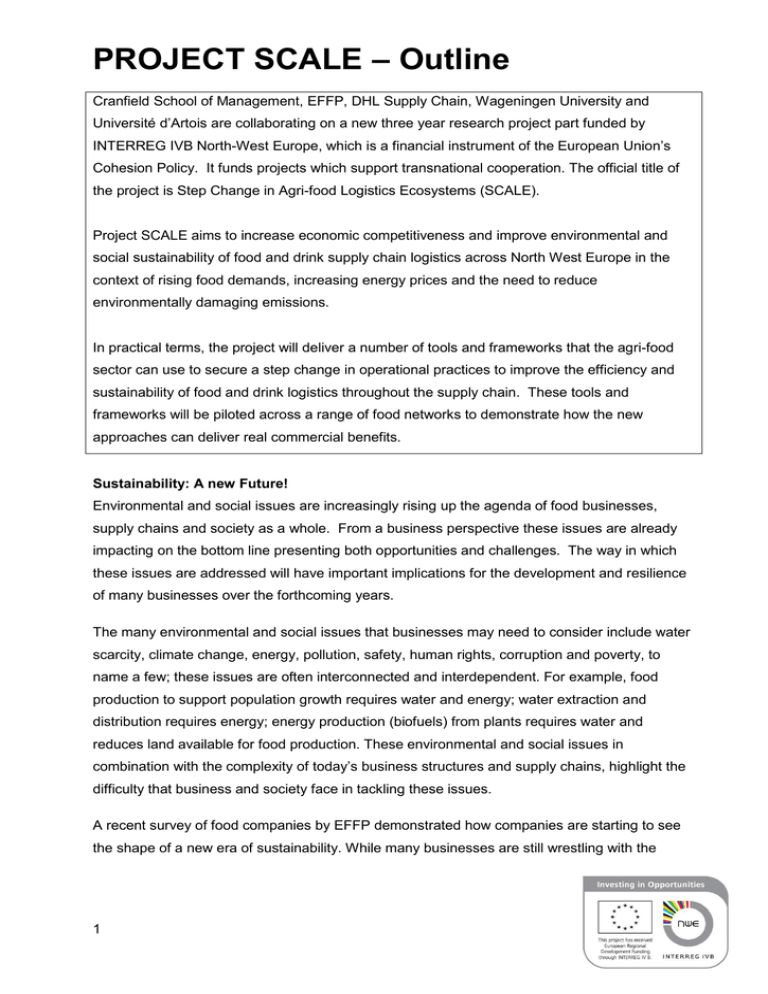
PROJECT SCALE – Outline Cranfield School of Management, EFFP, DHL Supply Chain, Wageningen University and Université d’Artois are collaborating on a new three year research project part funded by INTERREG IVB North-West Europe, which is a financial instrument of the European Union’s Cohesion Policy. It funds projects which support transnational cooperation. The official title of the project is Step Change in Agri-food Logistics Ecosystems (SCALE). Project SCALE aims to increase economic competitiveness and improve environmental and social sustainability of food and drink supply chain logistics across North West Europe in the context of rising food demands, increasing energy prices and the need to reduce environmentally damaging emissions. In practical terms, the project will deliver a number of tools and frameworks that the agri-food sector can use to secure a step change in operational practices to improve the efficiency and sustainability of food and drink logistics throughout the supply chain. These tools and frameworks will be piloted across a range of food networks to demonstrate how the new approaches can deliver real commercial benefits. Sustainability: A new Future! Environmental and social issues are increasingly rising up the agenda of food businesses, supply chains and society as a whole. From a business perspective these issues are already impacting on the bottom line presenting both opportunities and challenges. The way in which these issues are addressed will have important implications for the development and resilience of many businesses over the forthcoming years. The many environmental and social issues that businesses may need to consider include water scarcity, climate change, energy, pollution, safety, human rights, corruption and poverty, to name a few; these issues are often interconnected and interdependent. For example, food production to support population growth requires water and energy; water extraction and distribution requires energy; energy production (biofuels) from plants requires water and reduces land available for food production. These environmental and social issues in combination with the complexity of today’s business structures and supply chains, highlight the difficulty that business and society face in tackling these issues. A recent survey of food companies by EFFP demonstrated how companies are starting to see the shape of a new era of sustainability. While many businesses are still wrestling with the 1 PROJECT SCALE – Outline competing pressures of environmental, social and economic challenges, others are already opening up new markets and sources of demand and developing new business models to service these new demands. In considering the implications of this changing landscape and the potential opportunities and/or challenges it affords, the implications of environmental and social issues need to be balanced with both short-term economic drivers and fundamentally with long-term economic sustainability. Where logistics collides with social and environmental concerns The movement and storage of products are responsible for many of the social, environmental and economic implications within agri-food supply chains. Amongst other things holding inventory is a source of waste, vehicles create carbon emissions and cause congestion, and large quantities of energy are consumed moving goods around the world. Therefore addressing the social, environmental and economic impacts of agri-food supply chains cannot just be restricted to the production of raw materials on farms or the conversion of those raw materials in factories to food products, but must also take into account how products, in whatever state, move up and down the supply chain (supply chain logistics). But there are many obstacles and barriers to addressing these impacts inherent within agri-food supply chains. Fragmentation and a lack of coordination between businesses operating in a supply chain is common making it difficult to adopt a chain wide approach to solving the problems. Issues of connectivity between areas of food production and consumption create dilemmas around a desire to be environmentally and socially responsible versus the basic need to make food available, at the right price, where people want to buy it (not everyone can get to the local farm shop). How can businesses address sustainability? Choosing suppliers that meet a particular scheme of accreditation and putting in place traceability protocols seems to have become a common solution to the problem of addressing sustainability in many businesses. The food industry certainly hasn’t been slow to invent and adopt these. According to commission research1 over 181 food accreditation schemes are in operation across the EU and these are increasing at the rate of about ten per year. Meeting the requirements of any scheme is not free often requiring significant investment to establish, operate and monitor. Furthermore the majority of these initiatives are directed towards 1 http://ec.europa.eu/agriculture/quality/certification/inventory/inventory-data-aggregations_en.pdf 2 PROJECT SCALE – Outline addressing one particular issue within one specific part of the supply chain. It is very difficult for any single company to obtain a panoramic view of the sustainability of the entire supply chain and to understand fully the implications of both their actions, and the actions of others, on that supply chain. Where are we & where do we want to be? Today the indicators collated in supply chains tend to relate to economic measures such as: service levels, inventory, utilisation, cash flow and margin. Supply chains are invariably judged by their reliability, responsiveness, agility, cost and asset utilisation. However a supply chain cannot perform well on every measure. Trying to be a cost leader in a category does not reconcile easily with also being the most agile or responsive in that category. An analogy here is to consider the cost of supplying fresh versus frozen carrots. The former requires less inventory than the latter but far more responsiveness from the carrot suppliers. In the fresh category much more emphasis is need to coordinate field fresh readiness with demand whereas when frozen carrots are concerned the emphasis at the farm level is likely to be geared more towards maximising the volume grown on any piece of land. These factors alone are complicated enough without adding into consideration the variables associated with environmental and social performance indicators. What is needed is a way for businesses to make decisions that balance these financial drivers with the potential costs of mitigating against longer term environmental and social externalities. If businesses are able to measure and assess the Triple Bottom Line* of economic, environmental and social costs they will then be able to optimise these three elements to conceptualise how business might be done differently in the future. From an individual business point of view, the potential benefits from this approach could be substantial; however, if this can be achieved collaboratively throughout a supply chain then the results could be revolutionary, leading to a step chain in agri-food logistics. Project SCALE Project SCALE is a major new three year European project partly funded by INTERREG IVB North West Europe which is a financial instrument of the European Union’s Cohesion Policy. The project will be working with agri-food businesses across North West Europe to develop more sustainable transnational logistics systems. Whilst the focus of the project is to consider the impact of logistics on the Triple Bottom Line* the project is not just about moving stuff. Logistics today encompasses not just the movement and storage of goods but also the 3 PROJECT SCALE – Outline integration of information along supply chains, a requirement that necessitates a need for collaboration amongst businesses operating within a supply chain. How is the project organised? The project has three interconnected workstreams. The first of these will develop a new sustainability architecture that will enable agri-food businesses to conceptualise and optimise the financial, environmental and social costs of each unit of food delivered to the consumer. The second workstream will develop an innovative framework to facilitate the development of multiparty collaborative relationships, and finally the third will create a common platform to enable transparency and visibility of data across all businesses within a supply chain which in turn will facilitate three major live transnational pilots across North West Europe to test all the project outputs in a commercial environment. How will industry get involved in the project? The project, which started at the beginning of April, has embarked on a period of research across North West Europe. Over the next few months there will be a need to engage with food businesses and other stakeholders across the region as the project develops the frameworks and tools outlined above. This engagement will include an industry survey, focus groups and workshops to ensure that the views and thoughts of agri-food businesses are harnessed to shape the project. Ultimately, three transnational pilots will take place, putting into practice the tools and frameworks developed. Further information about the project will be available shortly online but more importantly a major social networking platform will be developed creating a central hub from which all project dissemination will be easily accessible encouraging live engagement and debate. In addition a series of six major international conferences will be run throughout the project enabling policy makers, academics, and business to get involved. What does this all mean? The issues of environmental and social sustainability are not going to go away; indeed we would argue that they will become more prevalent over forthcoming months and years. For some agri-food businesses the answer may well be more of the same, focusing on immediate issues in isolation using accreditation schemes and traceability protocols as a means to control and manage environmental and social issues. The more enlightened will take a holistic and collaborative approach taking into consideration all three elements of the Triple Bottom Line* 4 PROJECT SCALE – Outline and how they interact throughout the whole supply chain. Project SCALE will deliver a comprehensive range of tools, frameworks and technologies that the agri-food sector can exploit to secure a step change in operational practices to improve the efficiency and sustainability of food logistics across the North West Europe. The tools, frameworks and technologies will be piloted across a range of food networks to demonstrate how the new approaches can deliver the improvements that are increasingly being demanded by consumers and society as a whole. *The Triple Bottom Line (also known as people, planet, profit or TBL) captures an expanded spectrum of values and criteria for measuring business (and societal) success: economic, ecological, and social. PROJECT PARTNERS Cranfield School of Management, Bedford Cranfield School of Management is widely recognised as a world leader in supply chain research and development helping individuals and businesses learn and succeed by transforming knowledge into action. They are the lead partner for Project SCALE and also lead on the development of an innovative framework to facilitate the development of multi-party collaborative relationships. DHL Supply Chain Agri-food is a sector of DHL Supply Chain focussed on optimising customers supply chains. They have successfully applied their logistics expertise in agri-food supply chains using experience gained from other industries and are now recognised leaders in the grain, malt, milling and bakery sectors. Within the project their expertise in IT systems will bring the project to life by testing the outputs of the collaborative framework and Triple Bottom Line model through engagement with business culminating in the delivery of three transnational pilots. European Food & Farming Partnerships (EFFP) EFFP are a consultancy business specialising in the agri-food sector with a focus on supply chain collaboration. They have built a reputation for understanding the major challenges that face society and how these impact on agri-food supply chains and will bring this understanding 5 PROJECT SCALE – Outline to the project. More directly EFFP is responsible for the development of the new sustainability architecture that will enable agri-food businesses to conceptualise and optimise the financial, environmental and social costs of each unit of food delivered to the consumer. In addition they will take the lead on communications including the development and operation of the social networking platform Université d’Artois, Béthune, France The "Laboratoire du Génie Informatique et de l'Automatique de l'Artois (LGI2A)" in the University of Artois specialise in advanced mathematics and computing which enable it to build models and applications that support the optimisation and simulation of logistics. Their involvement in the project is to develop innovative approaches and tools to optimise economic, environmental and social impacts of supply chains in North West Europe. University of Wageningen, Wageningen, The Netherlands. The University of Wageningen is widely recognised as global leaders in sustainability and encompass many specialists and leading researchers in this area. In addition to its established academic and industry connections Wageningen already have a great deal of information and research that will be relevant to the project for example looking at sustainability in food supply chains, performance indicators and the Triple Bottom Line discussion. Within the project they have a specific focus to identify useful sustainability indicators. 6
